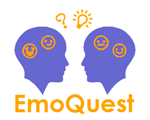Nowadays people are increasingly likely to search for information in social media, including online Question and Answer (Q&A) sites. For example, Stack Overflow is a popular community and the most authoritative source for code developers, with 4.7 million users who provide 17 million answers to 10 million questions. One of the biggest drawbacks of communication through social media is to appropriately convey sentiment through text. While display rules for emotions exist and are widely accepted for interaction in traditional face-to-face communication, web users are not necessarily prepared for effectively dealing with the social media barriers to non-verbal communication. Thus, the design of systems and mechanisms for the development of emotional awareness between communicators is an important technical and social challenge for research related to computer-supported collaboration and social computing.
The goal of this research is to understand the role of emotions in social media-based knowledge sharing, specifically in online Q&A sites. One of the main issues in effective online Q&A activity is the assessment of the quality of an answer and of the reputation of the users in the community. We intend to investigate how the emotional style of questions and answers incentives contributions, determines the perceived quality of information provided, impacts on the social reputation of users in Q&A communities, and influences how knowledge is shared.
Other than contributing to building knowledge on the role of Affective Computing in social media-based knowledge sharing, an expected output is a user-driven netiquette for online Q&A websites. It will incorporate emotional awareness in social media interactions, shedding new light on how emotion expression facilitates or impairs effective knowledge-sharing.
The main research domain of the EmoQuest project is Computer Supported Cooperative Work (CSCW), a multi-disciplinary field emerged in the 80s and boosted in the recent years by the rise of the Social Web. The expected output of this research will produce an advancement of the state of the art for some of the disciplines which guide and contribute to CSCW and in which the team members have a strong research expertise: Human-Computer Interaction and Affective Computing, Software Engineering, Linguistics and Psychology.
